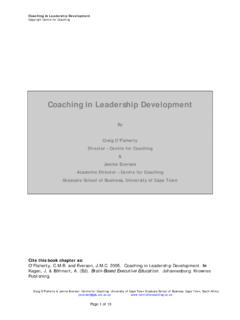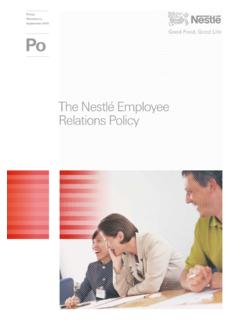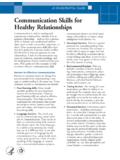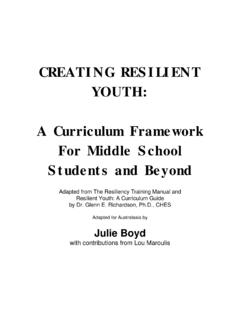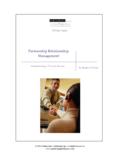Transcription of Coaching versus Mentoring versus Leading versus …
1 Coaching versus Mentoring versus Leading versus Managing Craig O Flaherty, (2003) Director Centre For Coaching , UCT Graduate School of Business Introduction It s a perennial debate. What is Coaching and how does it differ from other modalities or ways of being in a corporate context such as Mentoring , Leading and managing? These words are often thrown around interchangeably and yet describe very different ways of interacting with people. Coaching is probably the newest of these descriptors and yet the lack of real understanding of its roots, or way of showing up in a one-on-one or group situation, means that it is often used to label, justify or disguise actions and behaviours that are the antithesis of Coaching .
2 The role complexity of modern managerial or executive jobs exacerbates this situation by requiring today s leaders to master and utilize all of the aforementioned competencies. Deciding when to use which and having the skill to move in and out of each at the appropriate time is a subtle and demanding challenge. It is one that is made even harder by failure to understand the characteristics contained in being a leader, a manager, a mentor or a coach. This article explores these different corporate hats and the conditions under which each can and should be worn.
3 The Challenge For anyone occupying a role requiring the supervision of people performing tasks there is a good chance that ones explicit or implicit job description contains the words lead, manage, mentor or coach. These are becoming an accepted part of a competent leader s armoury. However, organizations have failed to acknowledge that each of these distinct ways of being require specific training and support. If one is assigned the responsibilities of driving a team towards defined outcomes and targets each of these four roles has an explicit purpose in this regard.
4 Joanne Hunt the leader of New Ventures North, a Canadian Coaching training business offers the following definitions (Hunt 2000): Managing Providing clear, concise focus on outcomes, deliverables and due dates to the team Leading Providing inspiration and encouraging the team to wards a vision which embodies new possibilities Mentoring Providing expert advice and guidance, taking members of the team under ones wing and providing a role model which the team can aspire to being Coaching Providing a development focus for new competencies.
5 Qualities and ways of being as team members Nothing in these definitions is likely to trigger new insights or debate. The real challenge lies in how one is able to skilfully understand which of the disciplines is required for the individual or team at a particular time and more specifically in how to avoid blurring the interaction between these very powerful and complementary tools Countless pages have been written on Leading , managing and Mentoring . For the purposes of clarity it s probably worth providing some insights on Coaching .
6 What is Coaching ? Effective Coaching is evident when the team member (or coachee) is able to demonstrate long term excellence in performance, is self-correcting and is self-generating (Flaherty, 1999). Long term excellence in performance refers to outcomes in the particular area being coached with reference to the appropriate standards of performance in that area what makes a good project manager is time to completion on budget. Self-correction means that the coachee is able to self-observe, know when their performance is off and make the necessary adjustment to get back on track.
7 Self-generating, involves being able to take the competencies being generated in the Coaching process with the coach and applying them to other realms of their life on an ongoing basis. If the purpose of the Coaching is to achieve desired outcomes then the role of the coach is to work with the coachee to find out what is limiting, restricting and blocking the achievement of such outcomes and work to assist the coachee in finding ways to move out of this state of being stuck. The coach s challenge is to work within the clients structure of interpretation (Flaherty, 1999) or way of seeing the world which determines how the person responds to people or situations.
8 The coach s role is to provide new language and practices, which allow the coachee to see the world in a new way. (Heidigger 1962). This enables the client to observe new possibilities in dealing with their situation and creates the context for new actions that can resolve the issues facing the coachee. The important distinctions implicit in Coaching is that when Coaching , the executive is not providing the answer or instructions or role modelling, as they would when working with the person in one of the other modalities.
9 (Hunt 2000). Although it might seem easier to work in a more directive modality by giving answers, this is less likely to leave the person self-correcting and self-generating. Providing Distinctions Between these Roles The essence of this article is to create awareness of the differences between these roles and to heighten debate in the search for increased effectiveness as a modern leader. The following table provided by Hunt (2000) sets the scene for this debate: Discipline Nature of Relationship (type of power)
10 Quality of Relationship Focus Managing Power difference between manager and subordinate Accountability Clarity of requirements Focus on deliverables Performance measures Reliability, stability Leading Power difference Leader/ visionary to follower/ implementer Inspirational Creating of 'new' Possibilities, visions Future opportunities Mentoring Expert / Learner Senior / Junior Development through expert guidance What to do, where to go Knowledge transfer Organizational history Coaching No real power difference (unless combined with a formal role as above)
